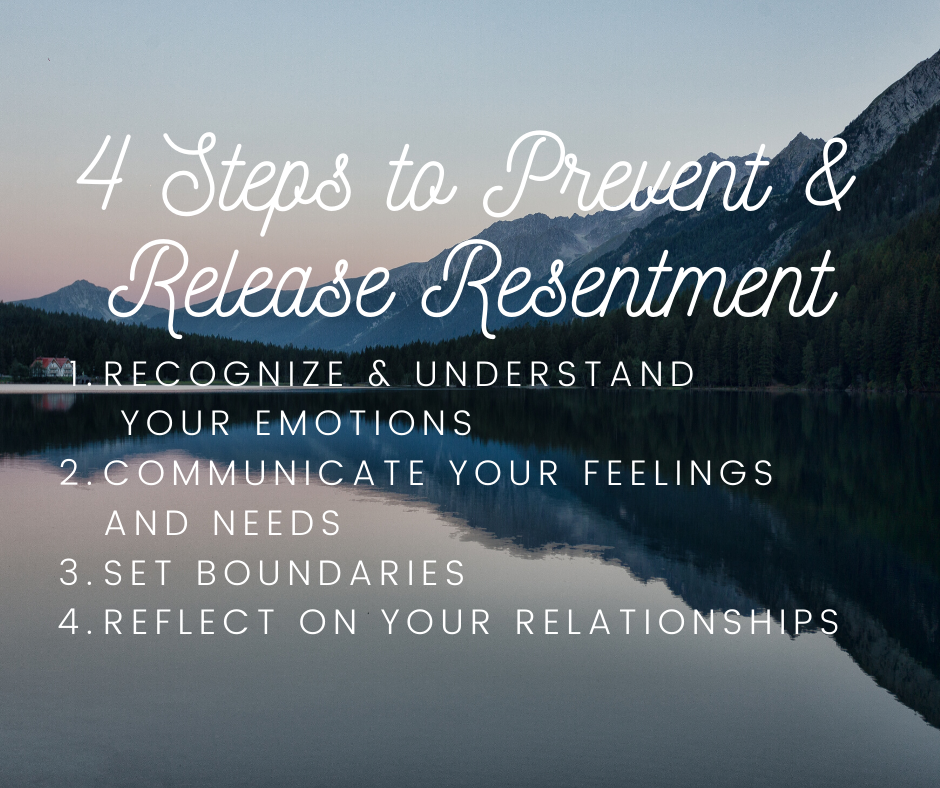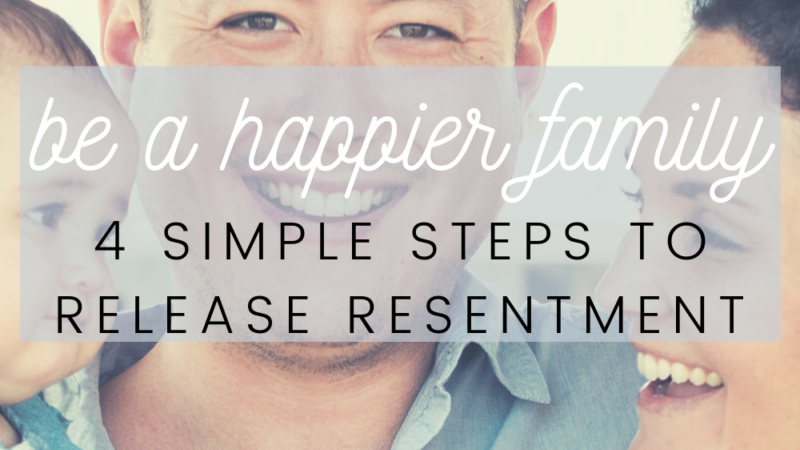You’ve been trying to get the baby to sleep for 45 minutes. It’s late, you’re tired, it takes all of your energy not to let yourself pass out. You hear the TV in the other room and find yourself annoyed, not just at the sound but at the idea of your husband chillin’ on the couch while you’re at your wit’s end.
Your potty training toddler just sat on the toilet for ten minutes without going. Less than five minutes later you’re cleaning pee off the floor for the third time today. Meanwhile she’s screaming because the dog took a dog toy from her hands. All you can think is how easy life was pre-kids.
I’m right there with you.
Sometimes exhaustion and fear get the better of me. Frustration creeps in and I long for the freedom I used to have but never fully appreciated. At times like this, it’s easier to place blame than to deal with my emotions.
This is the breeding ground for resentment.
I’ve seen the faces of parents who are disinterested in their children. The parents who are tired, frustrated, or even embarrassed by their kids’ behavior. I’ve seen the mom who wants to be the super-parent but also rolls her eyes when dad doesn’t know how to communicate with the kids. I’ve seen the dad at dinner with eyes glued to the nearest TV because he’d rather be watching the game. I’ve seen the couples that argue about the little things because they don’t talk about the big things. I see it everywhere. I’m not judging! I know that parenting and relationships are freaking hard and we’re all just doing the best we can. But I also know that I don’t ever want to resent my family.
In fact, I refuse to let my feelings fester into anger and resentment. So I did what any modern gal would do and Googled “causes of resentment” to better understand the thing I hope to avoid. With my research fresh in mind, I’ve made a plan to do everything in my power to prevent and release resentment. The goal, of course, is prevention. But part of growth is failure, so I wanted to come up with tools that will also help me release resentment for the times when my ego gets the better of me. Because let’s be real, I’m far from perfect. I know there will be hard days and moments of weakness. There will be tears and screams and meltdowns that aren’t always from my toddler.
Understanding Resentment
In order to prevent something you have to know what causes it. Before that, you first have to know what “it” is. So let’s start with a definition.
Resentment
Noun: A feeling of anger or indignation when you think you have been treated unfairly or without enough respect
Reading into that definition a bit, resentment is a feeling you have when you think you’ve been mistreated. It’s a negative feeling based on how we perceive someone else’s behavior.
Okay. So, what causes it?
Google taught me that resentment may come from a misunderstanding or even an imagined situation. For example, take the earlier scenario. You’re tired and frustrated because the baby isn’t falling asleep. You hear the TV in the living room and are annoyed because you’ve imagined that your husband is vegging on the couch while you’re desperately fighting to stay awake.
In reality, that wonderful human you married and can’t imaging doing life without just wanted some background noise while he’s doing the dishes, making the kids’ lunch for tomorrow and pouring you a glass of wine for when you eventually emerge from the darkness. (Can you tell I’ve been here before?)
On the other hand, resentment could arise from a true injustice. Perhaps your spouse regularly talks down to you or belittles you in some way. Every disrespectful remark s/he makes cuts into your self-worth and little by little your pain is growing and your love is fading. Naturally, you feel victimized and your anger in those moments is carrying over into other parts of your relationship.
In either scenario, the resentment we feel is our own feeling, which means we can change it. Please don’t misunderstand me. If you’re experiencing abuse I do not think you should accept it. What I mean to say is that harboring negative feelings toward someone will only breed more negativity. It will bring down your own energy and often causes a cycle of hurt.

Letting go of resentment is not easy, especially when caused by true mistreatment. If you are in that place, I’d like to recommend Gabrielle Bernstein’s guided Cord Cutting Meditation. “You can practice this Cord Cutting Meditation to clear negative energy that ties you to anyone. It’s not only for past relationships. If you currently resent someone in your life, this meditation will help you release that feeling.” And of course, seek help if needed.
Negative emotions such as resentment, judgment, frustration, etc. are sneaky little buggers that have a way of slowly building and creeping into your heart and mind, and therefore relationships. So I’ve put together a plan to nip them in the bud whenever I do experience them. Guys, I’m human. As grateful as I am for my life, it’s not always rainbows and butterflies.
4 Steps to Prevent & Release Resentment
Step 1: Recognize & Understand Your Emotions
So many of us just go through the motions of our lives. We’re not in the habit of even recognizing our emotions, which makes it impossible to change them. The good news is, creating this habit doesn’t have to be complicated. Set a few daily reminders in your phone that read, “How do you feel?” When your reminder goes off, take a minute to your question as specifically as possible. Are you happy? Bored? Tired? Energetic? Are you focused? Stressed? Anxious? Are your muscles tight? Are you dehydrated? (Okay, those last two aren’t emotions but DRINK WATER AND MOVE YOUR BODY!) In time, recognizing your emotions will become natural and second nature.
Now here’s the hard part. Once you’ve identified how you feel, ask yourself why you feel this way. Again, answer as specifically as possible. If you’re in a moment of resenting your toddler, the simple answer to “why” could be, “he’s not eating his dinner.” A specific answer may be something like, “I took the time to plan and cook dinner around foods I know he likes, but he’s not even trying them.”
Now, go deeper. Often when something causes an emotional reaction, it’s triggering a fear or a negative experience from our past. Understanding the root cause of our emotions will help us to empathize and release expectations. It also clarifies our true concerns so that we can address what’s really bothering us.
To continue with the example, ask yourself why your son not eating is making you emotional. The answer could be something like, “I’m worried that he isn’t getting the nutrients he needs to grow and stay healthy.” Or, “I’m afraid of what the Pediatrician and other moms will think if my son will only eat pizza and pasta.”
It’s okay mama, no one expects you to force feed your child. Try the cauliflower crust pizza and fortified pasta, keep offering carrots even if they end up dog treats.
Step 2: Communicate Your Feelings & Needs
Remember, resentment stems from our perception of someone else’s behavior. Now that you’re adept at recognizing your emotions, you’ll notice when you feel disrespected or wronged. Talk to the person who caused those feelings rather than letting the negative emotions grow! This is definitely something that is easier said than done. Believe me, I get it. Confrontation is NOT my thing. But it’s likely that the other person is totally unaware of how the behavior affected you. Which means that behavior will probably be repeated. So take a deep breath and think about the situation. What behavior triggered your emotion?
Once you identify the behavior that is triggering you, say it out loud. Follow up your statement with guidance for the other person. For example, “I get upset when I’m trying to get the kids to bed and you continue playing with them. I know having time at night with the kids is important to you. Instead of playing with toys when it’s time to settle down, can you read books with them once they’re in bed?”
When possible, communicate your needs before you reach a point of frustration/anger. “It’s getting late and the kids still need to brush their teeth. Please help me get them into the bathroom.”
Some of you are thinking, “That’s great Brittany but my two year old isn’t going to empathize when I say his behavior is triggering me.” To that I say, you’re right. Your toddler is still learning to process his own emotions. He shouldn’t be the person you go to when you feel upset, even if his behavior triggered your feelings. Sometimes just the act of writing down how we feel or saying it out loud to ourselves is enough to bring us perspective on the situation. If it’s not enough or if you just want the support of another human (perfectly natural and reasonable!) then talk to a friend, family member, Facebook group… whoever will listen and support you without judgment and without unsolicited advice.
Step 3: Set Boundaries
It’s important to know yourself and your limits. If showering alone for 15 minutes at night is something you need to keep your sanity, talk to your spouse about keeping the kids away from the bathroom. If you know you get frustrated the 4thth time you tell your daughter it’s time to take a bath, get the tub ready and put her in it the 2nd or 3rd time you tell her. If it bothers you that your husband watches TV at the end of the day while you’re trying to make dinner, take care of the kids, and clean the house, ask him for help.
I recently discovered Janet Lansbury and her respectful parenting techniques. I listened to the audio version of her book, “No Bad Kids – Toddler Discipline Without Shame” and the entire time I was thinking to myself that most of her communication principles would work wonders in any relationship. In regards to setting boundaries, her article Setting Limits With Respect – What It Sounds Like is a good place to start. It speaks specifically to communicating with children. But again, I really believe the principles of clearly communicating our limits and empathizing with but not fearing the other person’s emotions can be applied to any relationship. (Maybe save the consequences for the kids, not your spouse…)
Step 4: Reflect on Your Relationships
As I said earlier, I’m human and far from perfect. I know I won’t always have the energy and clarity to recognize my emotions and set limits before feeling frustrated. So, to prevent letting that frustration grow into anger and resentment, I’ve set a reminder in my phone to reflect on my relationship with my husband and daughter once a week. I chose a time I know I will be available (or can make myself available) and I’ll be asking myself what I can do to improve our relationships. If I remember feeling annoyed or wronged that week, I’ll practice steps 1-3 to release resentment and use Gabby Bernstein’s meditation. Again, my intention is to catch negative emotions before they fester. To “cut the cord” as Bernstein calls it, before they grow into resentment.

Maybe it’s the yogi in me. I truly believe that anytime we bring awareness and mindfulness into our lives we’re moving in the right direction. We’re taking a step toward love and peace. And I don’t know a single soul who couldn’t use more love and peace.
Thank you for taking the time to read this post. I truly hope it brings some light to your unique life experience(s) and helps you in becoming a happier person and family. Anyone with tips, practices, thoughts, or experience in preventing or letting go of resentment – sharing is caring! Comment below and help a fellow human out.
